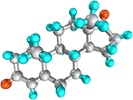Other hormones and biogenic amines 
- Hormones of the pituitary gland, epiphysis, adrenal glands, pancreas and other More about study.
- Fill in the analysis table, and Kiberis itself will calculate all the indicators and draw conclusions. Gender and age are taken into account in all calculations. The age norms may differ significantly from the well-known ones.
- What you entered is automatically used in express diagnostics
 , and then when selection of therapy , and then when selection of therapy  . .
- By starting to use the service, you agree to the user agreement. The service does not replace a visit to the doctor!
|
Adrenal hormones
- Cortisol (hydrocortisone) is a hormone produced by the outer surface of the adrenal cortex. It is an active glucocorticoid (stress hormone).
- Aldosterone - is responsible for the balance of water and salt metabolism in the body. Basically, it affects the tubular reabsorption of sodium and chlorine ions, while causing the excretion of potassium ions. Increases the hydrophilicity of tissues (the ability to retain water). Aldosterone deficiency causes diabetes insipidus.
- Norepinephrine and adrenaline are hormones that stimulate the work of the heart and blood vessels, as well as the processes of catabolism (decay) in tissues. They suppress gastrointestinal motility, catalyze the penetration of fatty amino acids into the blood, the rhythm of the heart, and form glucose levels.
- Renin in the blood is a marker (not a hormone) that determines the state of the renin-angiotensin system. The proteolytic enzyme is used for the diagnosis of hypertensive conditions, since it is responsible for the regulation of blood pressure and salt homeostasis.
- Aldosterone-renin ratio - used in the diagnosis of primary hyperaldosteronism (Conn's disease). It is calculated automatically in the presence of aldosterone and renin values.
Pituitary and epiphysis hormones
- Somatotropic Growth Hormone (STH), responsible for stimulating the development of bones, muscle mass and other organs. It also affects lipid metabolism and cholesterol levels in the body. Violations of the concentration of STH can lead to growth retardation (in children), obesity and atherosclerosis.
- Adrenocorticotropic hormone (ACTH)It stimulates the production of glucocorticoids in the adrenal cortex (cortisol, cortisone and corticosterone). Accordingly, its effects are manifested through the action of these hormones.
- Antidiuretic hormone (Vasopressin) is a hormone produced by the hypothalamus, which regulates the metabolism of water in the body. The analysis is used for the differential diagnosis of diabetes mellitus, its differences with the syndrome of excessive secretion of ADH. Another goal is to detect tumors of the APUD system.
- Melatonin is produced by the pineal gland, regulates circadian rhythms, blood pressure, activity of the endocrine system, increases the production of antibodies. Changes in its serum concentration occur in cardiovascular diseases, oncopathology, and mental disorders.
- Insulin-like growth factor 1 (Somatomedin-C, ITP-1) is a protein of the family of insulin-like growth factors, the main endocrine mediator of somatotropic hormone. The determination of somatomedin-C is combined with blood sugar, glucose tolerance test, somatotropic and adrenocorticotropic hormones.
Pancreatic hormones
- Insulin is a hormone of a peptide nature, formed in the beta cells of the islets of Langerhans of the pancreas. It has a multifaceted effect on metabolism in almost all tissues. The main effect of insulin is to reduce the concentration of glucose in the blood. It is considered the most studied hormone.
- The insulin resistance index (HOMA-IR) is an indicator that reflects the resistance of the body's cells to the effects of insulin. The calculation of the coefficient is necessary to determine the probability of hyperglycemia, atherosclerotic vascular damage, and the development of prediabetes. It is calculated automatically in the presence of glucose and insulin levels.
Clinics for research
Category - medicine
Rate the service 'Other hormones and biogenic amines'


